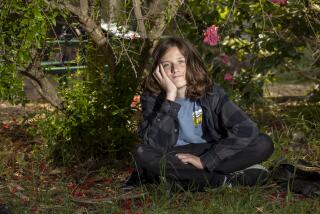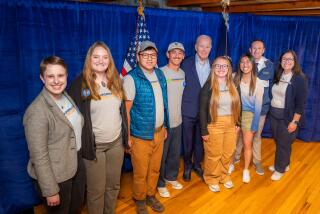More Freshmen Help Others, Survey Finds
Pitzer College freshman Adam Forbes spent his fall break in Mississippi as a volunteer helping to salvage homes flooded in the Hurricane Katrina disaster.
Forbes, who coordinated the effort at his Claremont school, was joined by 10 other Pitzer students, half of them also freshmen. The task involved hard labor, but finding volunteers willing to work in the muck “was easier than I expected,” he said.
That spirit, perhaps inspired by Katrina and other natural disasters in recent years, appears to reflect a broader pattern among freshmen this year at four-year colleges and universities around the country, UCLA researchers say.
In its annual “The American Freshman” survey released Wednesday, UCLA’s Higher Education Research Institute reported that first-year undergraduates’ interest in performing community service and assisting the needy has surged.
The survey -- based on polls last fall of 263,710 freshmen at 385 of the nation’s four-year schools -- found that 66.3% believe it is very important or essential to help others in difficulty. That figure, up from 62.4% in 2004, is the highest percentage in 25 years.
In addition, 26.3% said there was a “very good” chance they would participate in volunteer or community service while in college, up from 24.1% a year earlier and the highest since researchers began asking that question in 1990. In all, 67.3% of freshmen said there was at least “some” chance they would do such work.
These and other findings in the survey demonstrate that this year’s freshman class “cares about civic and social responsibilities,” said John H. Pryor, director of the UCLA survey.
Pryor and other researchers who worked on the survey said the outlook probably stems partly from disasters, such as the Indian Ocean tsunami, that occurred during the freshman students’ senior year of high school, and Hurricane Katrina, which hit the Gulf Coast in August as many of them were preparing to begin college.
Those events occurred at “an impressionable time in their lives,” said Sylvia Hurtado, director of UCLA’s Higher Education Research Institute and a coauthor of the report. She said the survey findings reflect a significant break from a pattern in recent years of students mainly focusing on self interest, including such goals as making more money.
UCLA researchers acknowledged that it isn’t clear whether the attitude will be long-lasting.
For one thing, there is a drop in volunteerism as young people enter college. A record-high level, 83.2%, of the freshmen said they did volunteer work during their senior year of high school. But high school volunteerism was not purely altruistic: Some students participated because their schools require community service and some because it bolstered their college applications.
Still, officials involved in college student life have noted a recent upturn in community service, especially during vacations and breaks.
“What we’re looking at this year is an exponential increase in interest in alternative spring breaks,” said Jeff Rubin, the Washington-based spokesman for Hillel, a Jewish campus organization.
He said Hillel recently sent 135 students to help with flood repairs in Biloxi, Miss., and had plans to dispatch 300 more in March, along with arranging trips with social justice-related goals to Israel, Central America and parts of the former Soviet Union.
For Forbes, the work in Mississippi was just one of many involvements in social action projects.
The 19-year-old New Jersey native is working on environmental projects at a Pitzer ecology center and organizing a fundraiser to support people whose lives were disrupted by Katrina, the Pakistan earthquake and the genocide in the Darfur region of Sudan in Africa.
“I’m pretty much overloaded,” Forbes said.
The UCLA survey also identified some of the extra challenges that first-generation college students face in pursuing an education. Among the freshmen surveyed, 29.4% of first-generation college students came from homes with an annual family income below $25,000, compared with 9.2% of other freshmen.
In addition, 30.7% of first-generation college students plan to live off campus their freshman year compared with 16% of other first-year students, and 36.7% expect to work full time while attending college, compared with 24.7%.
Researchers say dropout rates tend to be higher among students who live off campus and who work long hours in off-campus jobs.
Because so many first-generation undergraduates are subject to pressures that pull them away from campus, Pryor said, “colleges need to look for other ways to engage these students.”
The survey also found:
* That 36.4% of freshmen believe it is important or essential to keep up-to-date with political affairs. That was up from 34.3% a year earlier, and the highest level since 1993.
* That 34.2% support increased military spending, down from 35.4% a year earlier and the lowest since the question started being asked regularly in 2002, when the level was 45% in the aftermath of the Sept. 11 attacks. The current war in Iraq may be cutting into such support, Hurtado said.
More to Read
Sign up for Essential California
The most important California stories and recommendations in your inbox every morning.
You may occasionally receive promotional content from the Los Angeles Times.









